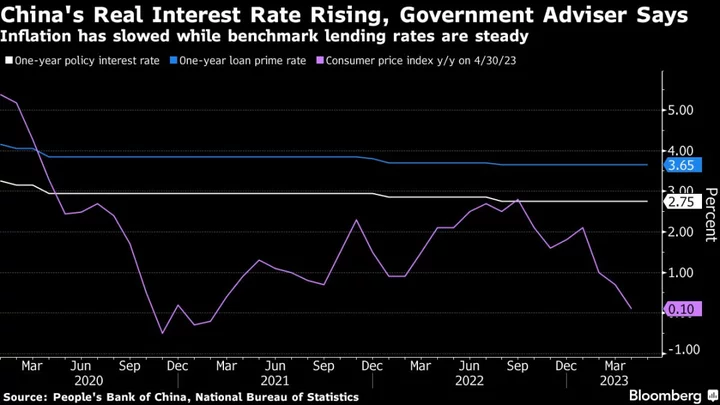China should cut interest rates to alleviate private firms’ financing burdens and boost the economic recovery, according to a prominent economist and government adviser.
Private companies’ borrowing costs far exceed that of state-owned enterprises so the authorities should guide benchmark lending rates lower to bring down loan rates for private businesses, Liu Yuanchun, president of Shanghai University of Finance & Economics, said late Thursday.
“This will be beneficial to the Chinese economy’s recovery,” said Liu on the sidelines of the Lujiazui Forum in Shanghai. “It’ll be better if the rate cut comes as a part of a package of support policies.”
Liu has consulted with President Xi Jinping and former Premier Li Keqiang several times in recent years. He advised the Politburo, the Communist Party’s top decision-making body, last year on how to regulate capital.
An increasing number of economists are calling for the central bank to step up monetary stimulus after a slew of disappointing economic indicators showed the economic recovery is softening. Some analysts forecast a cut to key policy interest rates as soon as next week as well as a reduction in banks’ reserve requirement ratio in coming months.
Loan rates are now lower than 1.8% for leading SOEs but as high as 9% for many private firms, Liu said, citing his own research. This means much of the rapidly-growing money and loan supply has ended up only circulating among SOEs, government agencies and within the financial system, he said.
Read more: China’s Weak Inflation, Borrowing Show Economic Recovery Waning
China is also facing pressure to cut rates because its real interest rate has risen to a relatively high level due to slowing inflation, adding to the financing burden on companies and households, Liu said. Meanwhile, real interest rates in the US and Europe are relatively low due to high inflation, he said.
“China is under pressure to cut rates based on the trend of global real interest rates,” said Liu.
Real interest rates measure the actual rate of interest allowing for inflation. Pan Gongsheng, head of the foreign exchange regulator, said at the same event that China’s real interest rate — calculated by subtracting the rate of inflation from two-year government bond yield — is about 1.7%, which is on par with that in the US.
Possible Stimulus
Any rate cut should be moderate as it’s more important that the government make a gesture to show their stance and the country is still facing a “complicated environment” Liu said.
However, he is not too concerned about risks of capital outflows because the gap in real interest rates between China and the US isn’t as wide as many imagined.
Authorities should also step up fiscal support to the economy, as broad government spending has been slow due to local governments’ heavy debt burden and slumping income from land sales, Liu said.
The central government should expand its fiscal spending, and increasing financing support through policy banks could be a potential way to achieve this goal, he said.

